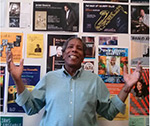 |
 Joe Major |
The Skidmore Jazz Institute All-Stars boasted a faculty roster so chockablock with esteemed leaders and first-calls that it would require two septets over two evenings to embrace them all. This evening’s program highlighted originals, nuanced arrangements and an all-star stamp on numbers by Dizzy Gillespie and Thelonious Monk in commemoration of their centennial anniversary. The Jazz Institute itself was celebrating its 30th year, and the collegial cohesion and camaraderie among the instructor brethren sparked a noticeable frisson in a Zankel Music Center packed with students and enthusiasts. The starting line-up consisted of: Jon Faddis, trumpet; Jimmy Greene, tenor saxophone; Michael Dease, trombone; Bill Cunliffe, piano; Vic Juris, Guitar; Rufus Reid, bass; Dennis Mackrel, drums. They exhibited the easy rapport and spirited play befitting a celebrated home game. Opening with Cunliffe’s reworking of Oliver Nelson’s “Stolen Moments,” the band whispered and lolled about delectably. Greene’s sax reveled in tones of tryst acknowledgement, as did Dease’s trombone, in sputtering accord. Juris’s guitar was a loose pool of mercury, and Faddis’s trumpet took murmurous, amorous bites. Reid’s bass was intimately fleshy and harked of instant memoir, memories in the making. Stir in piano and Mackrel’s drums and the band’s ability to shape a narrative became crystalline. They next delved into “Dizzy’s Business,” as popularized by Cannonball Adderley. The tune and delivery were so reflective of Gillespies autobiography title, “To Be, or Not…to Bop,” that you couldn’t help but appreciate how thriving that business was. Faddis in particular squealed, peaked and launched his inimitable skyrockets. The saxophone solo felt entrenched, obliged to fulfil the essence of a task at hand, and Juris was pliable and ringing. Their unison work simply took flight. A pair of poignant ballads followed: Dease’s “Brooklyn,” named for his yet born daughter and Greene’s “Someday,” an appeal, on behalf of his Ana, to “Love and appreciate now. Someday you might not be able.” On “Brooklyn” everyone contributed to a buffered, womblike atmosphere. Juris’s guitar had an appropriately ethereal, weightless lilt and Reid’s bowed bass yawned expectantly. Dease’s trombone phrasing could barely contain his expression of awe and admiration. I’ll swear that Cuniliffe glowed, that Faddis squeaked in “almost born” squeakiness, and I’ll further attest that Reid and Mackrel throbbed. After which, set up by a reverent piano processional, Greene’s “Someday” aspirational saxophone captured every last wrenching ounce of conviction and succor, emotionally soaked and exposed. His coda, as the band laid out, was so hopeful yet so wary of “Someday” not arriving that it seemed strikingly, eerily, pre-bittersweet. Up next, “Sim” was a Juris original dedicated to the recently deceased guitarist Larry Coryell, a duet partner of many years. The fleeting, celestial echo chamber that Juris created left room for gently churning hornless swing and a magisterial piano override. His piercing, scrambled lines clipped and choked with sublime emotional intensity. The horn line returned and, in keeping with the mood of grace, segued into Dizzy’s “Con Alma.” It featured Reid’s meditative, bowing bass intro setting the table and portioning dollops of “with soul” at every place setting. The round of horn solos filed their testimonial statements as if they were character references. Cunliffe offered a sanguine piano interjection and everyone reprised the peaceful cymbal-splashed theme before keys and bass, meriting awe-filled nods from the group, tenderly put the enterprise to bed. Cunliffe then saluted the vision of Jazz Institute founder Don McCormack, who was in attendance, and Faddis acknowledged a debt of gratitude to Institute staff, students and even more broadly, mentoring musicians of yore. He specifically recounted his first encounter with Eubie Blake’s “Memories of You” and dedicated it, “To anyone who’s ever lost someone that they loved.” With the stage cleared, following a nod to Jimmy Greene, he and Cunliffe proceeded in a duet draped in adoration and longing. Faddis’s tone, urged on by the piano, seemed to spiral toward that twinge point where the flap of bleating notes can only express a searing, quivering hurt. Monk’s “Rhythm-a-Ning” was their bust-out finale, paralleling in verve all the gang attack exuberance of their earlier Diz biz. Their rollicking asymmetrical jaunt began with: Greene scaling the sax Alps; Dease chewing on what had just been summited; Juris seasoning it all with spikey runs; Faddis orbiting in his signature stratosphere; Cunliffe in fact “rhythm-a-ning;” Reid applying staccato bottom accompaniment; Mackrel pelting and popping in the detonation zone. Monk was clearly in the adventure business. Tonight’s Skidmore Jazz All-Star post-performance stat sheet read like a mapped marvel of collective support, nimble assist and agile scoring. Their sheer virtuosity earned them laureate status, hands down. And their one-time creative confederacy defined the all-embracing, elastic adaptability of jazz diction writ large.
|